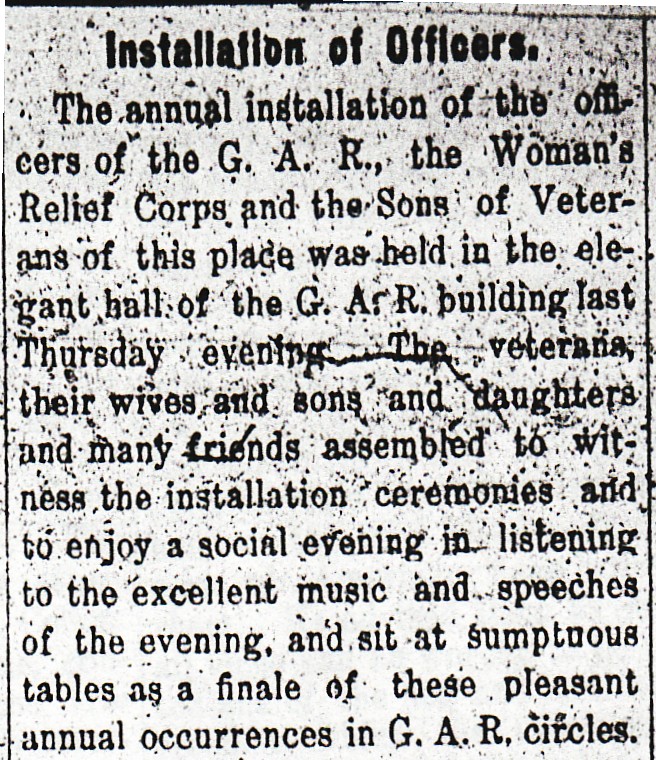Lykens G.A.R. Installs Officers, 1903
Posted By Norman Gasbarro on December 10, 2011
The following article appeared in the Lykens Standard, 9 January 1903:
INSTALLATION OF OFFICERS
LYKENS.– The annual installation of the officers of the G.A.R., the Woman’s Relief Corps and the Sons of Veterans of this place was held in the elegant hall of the G.A.R. building last Thursday evening. The veterans, their wives and sons and daughters and many friends assembled to witness the installation ceremonies and to enjoy a social evening in listening to the excellent music and speeches of the evening, and sit a sumptious tables as a finale of thse pleasant annual occurrences in G.A.R. circles.
Mrs. Charles E. Mosser of Hughesville, but a former Lykens lady, sang two solos during the evening, which added greatly to the enjoyment of all present. The Hoffman boys’ quartet also sang to the delight of the guests. The installation services on these occasions are always beautiful, solemn and impressive, and if those who so often witness these patriotic rites and ceremonies, would live up to their obligations and teachings, they could not fail but be a means of inculcating a lofty patriotism in the minds and hearts of all who attend them.
The Rev. J. R. Groff of St. John’s Lutheran Church, made the first speech of the evening. He had been present at the dedication of the the National Cemetery at Gettysburg when Abraham Lincoln dedicated those historic grounds; sat on the platform with the dignitaries on that occasion; shook hands with Mr. and Mrs. Lincoln and was always deeply interested in the veterans of the Civil War. He reminded his hearers that the exercises were to conclude in the room beneath them, and never liked to interfere with the banqueting features of these occasions would conclude his speech.
Prof. Yeingst was called and made a few remarks. Rev. I. M. Fetterolf of the Reformed Church reminded his hearers that he appeared in the capacity of chief mourner on the occasion. He illustrated by saying that the nearest relative to one who was being conveyed to his funeral, objected to riding in the carriage next to the hearse, but upon being urged to do so consented, with the remark that it would take all the pleasure out of the occasion for her. So a speech on this occasion, marred his pleasure.
Rev. D. L. Mackensie was called on to make some remarks, and assured all present that they would be happier and have a better opinion of themselves tomorrow morning, if they did not get down very soon into the room below, and if they did not tarry long when they got there. He was thinking of the nightmares and bad headaches that resulted from late banquets. He then reminded all present that the occasion was an important one for instilling some useful lessons, and made a speech abounding with lofty patriotism. He advised the Sons of Veterans to remember the solemn vows they had taken with uplifted right hand and with the left hand on the open Bible amid the display of American flags all around them. He advised them to put away all vices and be worth to be the custodians of the flag and institutions of freedom which the veterans would soon hand over to them untarnished.
The Rev. Collum was called on and remarked that Mr. Fetterolf had preempted the story that he was going to tell. But he said he was like the colored evangelist in the days of the Second Adventists who had made all arrangements to ascend into Heaven when the world would come to an end. The colored brother had led his flock out into a hay field. The evangelist had gotten on top of a stack of hay, all arrayed in white, and awaited calmly the end. Some wag struck a match and set fire to the haystack, and with flames rising on all sides of him, the evangelist cried, “I’m in hell, just as I expected.” This is the way a speech on this occasion made the speaker feel.
The services concluded in the hall, all descended to the dining room, where elegant refreshments awaited them. After suppylying all the wants of the physical man the guests of the evening retired to their homes with delightful memories of the evening. The officers installed during the evening were as follows:
G.A.R.: POST COMMANDER, John Zarker; VICE COMMANDER, Amos Kuntzelman; SECOND VICE COMMANDER, Josiah Minnich; QUARTERMASTER, Rev. L. D. Steckel; ADJUTANT, George A. Pinkerton; OFFICER OF THE DAY, William Hawk; SERGEANT, M. M. Hoffman; CHAPLAIN, Cyrus Bitterman; OUTER GUARD, William Williams; TRUSTEES, Joseph Buchanan, M. M. Hoffman, Cyrus Bitterman; DELEGATE TO STATE CONVENTION, M. M. Hoffman; ALTERNATE, A. Kuntzelman.
WOMAN’S RELIEF CORPS: PRESIDENT, Lucy Alvord; SENIOR VICE PRESIDENT, Laura Barrett; JUNIOR VICE PRESIDENT, Kate Nau; SECRETARY, Ella A. Ely; TREASURER, Sarah Myers; CHAPLAIN, Lydia Kerschner; CONDUCTOR, Ellen Minnich; ASSISTANT CONDUCTOR, Anna Hoover; GUARD, Harriet Ely; ASSISTANT GUARD, Matilda Bainbridge; FIRST COLOR BEARER, Ellen Seal; SECOND COLOR BEARER, Clara Miller; THIRD COLOR BEARER, Rebecca Ely; FOURTH COLOR BEARER, Sarah Fothingill.
SONS OF VETERANS: CAPTAIN, Ed M. Keiser; FIRST SERGEANT, Amos Minnich; FIRST LIEUTENANT, Harris St. Clair; SECOND LIEUTENANT, William Hoffman; QUARTERMASTER, Samuel Spangler; CHAPLAIN, Elmer Spangler; CHORISTER, Harry Grow; OUTER GUARD, Albert Hoffman; INNER GUARD, John Williams; CAMP COUNCIL, H. F. Bueck, — Hoffman, Amos Minnich.
 ;
;



Comments